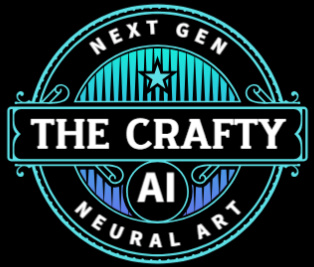www.thecraftyai.com
How to write effective prompts - Part 2
One of the most exciting (and sometimes frustrating) parts of AI image creation is writing prompts—the short text descriptions you give the AI to generate your image. A prompt is like a magic spell. The clearer and more intentional it is, the better the results.
But don’t worry—writing good prompts isn’t about being a poet or programmer. It’s simply about learning how to describe your vision in a way the AI understands. In this part 2, you’ll learn exactly how to write prompts that give you beautiful, detailed, and accurate images—whether you want realistic portraits, dreamlike landscapes, or fantasy characters.
Writing effective prompts is the key to unlocking accurate and visually striking results in AI image generation. A good prompt is clear, descriptive, and specific—it tells the AI exactly what you want, including the subject, style, mood, setting, and any desired details. Start with the main subject (e.g., “a female astronaut”), then add context (like “floating in deep space”) and stylistic cues (such as “in a retro comic book style” or “realistic lighting”). Avoid vague terms and instead use vivid language and concrete descriptors. The more intentional and well-structured your prompt, the more control you have over the final output.
🔹 What Is a Prompt?
A prompt is a sentence or phrase that tells the AI what to generate.
Example:
“A young woman standing on a cliff at sunset, wearing a flowing red dress, cinematic lighting, ultra-realistic”
The AI takes that description and uses it to build the image from scratch.
🔹 Anatomy of a Strong Prompt
A good prompt usually has 4–6 building blocks:
Subject – What is the image of?
“A robot samurai”, “A cyberpunk woman”, “A forest with glowing mushrooms”Setting/Background – Where is the subject?
“In a futuristic city”, “on a mountaintop”, “underwater”Style/Look – How should it look?
“Oil painting”, “anime style”, “photorealistic”, “digital art”, “cyberpunk theme”Lighting/Mood – What’s the tone?
“Cinematic lighting”, “soft morning light”, “moody atmosphere”Details – Add accessories, colors, and emotion
“wearing gold armor”, “neon blue hair”, “foggy”, “smiling”Camera/Format (optional) – Think like a photographer
“portrait shot”, “wide angle”, “close up”, “high resolution”
🔹 Basic to Advanced Prompt Examples
Beginner:
“A fairy in a forest”
Better:
“A magical fairy with silver wings, glowing in a misty enchanted forest, fantasy style, soft light”
Advanced:
“Portrait of a silver-winged fairy, glowing skin, in a mystical forest with floating lights, soft backlight, fantasy digital art, detailed eyes, dreamy atmosphere”
🔹 Tips for Better Results
✅ Be specific – The more clearly you describe what you want, the better.
✅ Use commas to separate ideas (most AI models read commas as pauses).
✅ Describe style and quality (e.g., “ultra-detailed, digital painting”)
✅ Experiment – Try slight changes to see how results vary.
✅ Avoid vagueness – Instead of “nice photo,” try “cinematic portrait in warm golden hour lighting.”
🔹 Common Styles You Can Try
Keywords to use in a subject, examples -
Realistic: Photorealistic, 8K detail
Anime: anime style, clean lines
Fantasy: epic fantasy art, glowing atmosphere
Sci-Fi: cyberpunk, neon colors, futuristic armor
Watercolor: delicate watercolor painting, soft tones
Abstract: vibrant abstract shapes, fluid motion
Retro/Vintage: 1980s aesthetic, film grain
🔹 Keep a Prompt Journal
It’s a good idea to keep a notebook or digital document where you save:
Prompts that worked well
Variations you want to try
Specific words or phrases that give your favorite results
This becomes your prompt library—a valuable creative tool over time.
🔹 Final Thought: Your Words Are the Brush
The AI doesn’t know what you meant, only what you typed. So the more clearly and creatively you write, the more control you have. Think of prompts as your paintbrush—and each word adds color, depth, and direction.
The good news? You don’t need to be perfect—just curious and playful. With practice, you’ll learn how to speak the AI’s visual language and create incredible images every time.
© 2025. All rights reserved.

